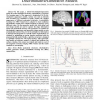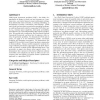47 search results - page 3 / 10 » AURA: a hybrid approach to identify framework evolution |
CMSB
2007
Springer
14 years 3 months ago
2007
Springer
For modeling and analyzing regulatory networks based on qualitative information and possibly additional temporal constraints, approaches using hybrid automata can be very helpful. ...
ECCV
2008
Springer
14 years 11 months ago
2008
Springer
In this paper, we address the problem of surface tracking in multiple camera environments and over time sequences. In order to fully track a surface undergoing significant deformat...
BIOINFORMATICS
2010
13 years 9 months ago
2010
Motivation: Tumorigenesis is an evolutionary process by which tumor cells acquire sequences of mutations leading to increased growth, invasiveness, and eventually metastasis. It i...
TMI
2008
13 years 9 months ago
2008
In this paper, a hybrid discriminative/generative model for brain anatomical structure segmentation is proposed. The learning aspect of the approach is emphasized. In the discrimin...
ATAL
2007
Springer
14 years 1 months ago
2007
Springer
Multi-Agent Agreement problems (MAP) - the ability of a population of agents to search out and converge on a common state - are central issues in many multi-agent settings, from d...


